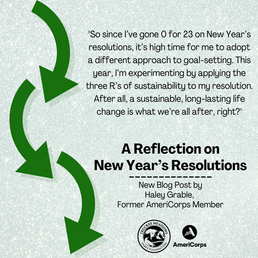Down to Earth Gives Us the Dirt on Composting
This week’s blog post comes from local non-profit, Down to Earth Composting. Oz Kupoglu, Lead "Rot Rider" at the organization, gives us all the dirt on composting such as its benefits to the environment and what we can do to get started.
Click here to learn more about composting "dos and don'ts"
Composting 101

Composting is a natural occurrence in nature. One place that you can see it is when you are walking in the forest. Leaves fall and cover the ground, creating a warmer environment for the mycelium and microorganisms. They then go to work by decomposing what has fallen to the forest floor. Once broken down, the soil becomes rich in nutrients that helps to feed the living trees and plants. As an at-home composter, we are mimicking what the forest ground does to create rich and healthy soil.

Why do we compost?
Composting is a great way to keep our Mother Earth happy! A single person at home can divert thousands of pounds of food waste from landfill back into our gardens, to be used to grow plants. Instead of dumping leftover foods, or parts of fruits and veggies we do not eat, we can decompose those things in our own backyards to create soil. That will also save us from having to purchase soil to feed our gardens. Having the nutrients from our leftover/unused foods feed our plants and gardens, which is a huge benefit to composting.
What can we compost?
Deciding what will compost, and what does not compost, can be a little challenging to navigate. Depending on certain commercial composting facilities, guidelines can change. It is best to reach out to your local facility, and ask questions. When you are composting at home, a good rule of thumb is to keep your compost living by feeding it with leftover fruits and veggies from the kitchen, lawn clippings, and fallen leaves. You can think about your compost as food for plants, and to feed them with the nutrients they need.
For example:
Nitrogen- grass and greens
Carbon- leaves and browns
Oxygen- the soil gets this naturally but we can help by "turning" the compost which basically means getting oxygen to all parts of the soil.

When do we compost?
You can start composting at any time of the year. Depending on the things you compost, this can be a quick process (6 months to a year) or a longer process (over a year). That is the great thing about composting, it is a natural process that happens. If you just help a little, mother nature will do all of the work.
Where do we compost?
Composting can happen in many different ways. From a small bin, or a huge pile, to a compost facility on a major scale. The main things to look out for in your home compost is temperature; the warmer the better. A sunny spot in the yard would be ideal.
Stay grounded,
Oz
Down to Earth is a local organization that does pickup and drop off service for your compost! Visit their website to learn more about their services and to sign your house up! Members can receive up to 40 gallons of finished compost a year!
Be sure to keep following our #stewardshipchallenge for the rest of the month and feel free to tag us on Facebook and Instagram with your own Stewardship Challenge tips!

















loc79 là cổng game bài uy tín số 1 hiện nay. loc79 cung cấp đa dạng thể loại trò chơi với giao diện đẹp mắt. Tham gia ngay loc79 tại để có cơ hội nhận nhiều phần quà hấp dẫn.
Sunwin là cổng game bài uy tín số 1 hiện nay. Sun Win cung cấp đa dạng thể loại trò chơi với giao diện đẹp mắt. Tham gia Sun win tại Sunwin người chơi game bài đổi thuởng có cơ hội nhận nhiều phần quà hấp dẫn. Là game bài nổi tiếng uy tín và được yêu thích nhất hiện nay, Sunwin đã khẳng định vị thế của mình trong thế giới sòng bạc trực tuyến cũng như game bài online khi cung cấp nhiều tựa game hay thu hút hàn triệu người chơi mỗi ngày.
The insights shared in "Down to Earth Gives Us the Dirt on Composting" are truly enlightening. It's fascinating to see how composting not only reduces waste but also enriches the soil, promoting a healthier environment. For those who might struggle with balancing eco-friendly practices and academic commitments, consider exploring resources like https://academized.com/case-study-writing-service writing service. They can assist in crafting well-researched papers while you focus on implementing sustainable habits. Overall, the article emphasizes the importance of composting in nurturing our planet, inspiring readers to take action and make a positive impact in their communities.